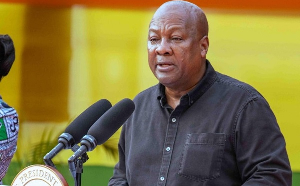Accra, April, GNA - President John Evans Atta Mills on Thursday stressed international co-operation and transfer of expertise and technical assistance to address the world food crisis.
He said nations should be able to combine good scientific human expertise with the vast available land to ensure food sufficiency. President Mills made the observation when the heads of Food and Agriculture Organisation (FAO) and the World Food Programme (WFP) Jacques Diouf and Josette Sheeran, respectively paid a joint courtesy call on him in Accra.
President Mills told the two heads, who are on an official visit to Ghana, that they had come at an auspicious time when rains had started, and re-echoed that agriculture was on top of Government's priorities. He assured the two organisations of Government's co-operation to ensure that the best practices, as Government also expected assistance to carry out its food sufficiency programmes, mentioning in particular the School Feeding Programme, which Government had intended to expand to cover all schoolchildren.
President Mills said it was necessary to be able assist children to grow up to develop their talents and to develop the human resources.
"I've no doubt that this will yield positive results," President Mills said The two heads said they were stepping up support to keep Ghana on course in its fight against hunger and poverty, stressing that millions of people remained vulnerable amid the global financial crises and high food prices.
At a time when more people than ever are going hungry worldwide, Ghana has been successful in fighting the trend, but continues to face new challenges.
Ghana is the only country in sub-Saharan African which has achieved the hunger reduction target of the Millennium Development Goal aimed at halving both hunger and poverty by 2015.
Based on FAO statistics, the estimated number of undernourished people in Ghana dropped steadily from 5.4 million people in the 1990-92 baseline period to 3.0 million in 1995-97, followed by a further decrease to 1.9 million in 2003-05, although child under nutrition is not improving. Still, the financial crisis, rising inflation, food price increases and climate-related shocks, such as floods and droughts, threaten to keep Ghana's success from reaching more people in this country of about 23 million.
"The global financial crisis is a major threat to the progress that Ghana has made in the fight against hunger and poverty". The WFP Executive Director Josette Sheeran said.
"We will do everything we can to ensure the MDG can still be maintained and urge the international community to step u support at this crucial time".
General News of Thursday, 23 April 2009
Source: GNA












